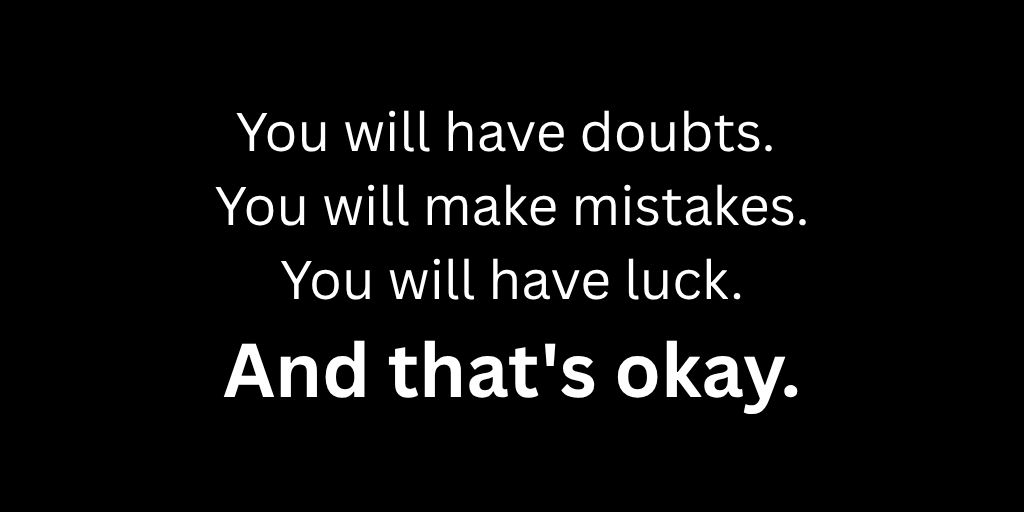Living With Imposter Syndrome
I’m Still Figuring It Out (And That’s Okay). Are you?
For many years, I didn’t even know imposter syndrome was a thing.
I just thought the doubt was part of me.
Sometimes it’s funny, almost absurd.
I’ll catch myself thinking,
Wait, who put me here? Is this a mistake?
It’s crazy how easily your mind forgets everything you’ve done the moment doubt appears.
It’s so easy to forget about all the hard work, all the late nights, all the things that got me here.
When I started my company, I thought those feelings would disappear once we had more clients, a real team, visible success.
They didn’t.
If anything, they got louder.
Every time we reached a new milestone, my mind found a new reason to question it.
“You just got lucky.”
“You’re not as good as they think.”
“What if they realize you’re just figuring it out too?”
What Is Imposter Syndrome?
Imposter Syndrome is that persistent feeling that you’re not as capable as you are, that you’re somehow “faking it,” and at any moment, someone will find out. Or that all things will go wrong.
It’s not a lack of competence. It’s a distortion of perception.
Even when there’s plenty of evidence you’re doing great, the mind keeps doubting.
It’s common among high achievers, founders, and leaders, people who constantly push beyond their comfort zones.
And here’s the twist: it’s not just us.
Famous people like Maya Angelou, Tom Hanks, Michelle Obama, and even Albert Einstein have openly spoken about feeling like imposters at times.
If they can feel it, people who’ve achieved incredible things, then maybe it’s just part of being human.
The Realization
For a long time, I saw that voice as proof that I wasn’t ready.
But one day it hit me, maybe confidence isn’t about getting rid of self-doubt.
Maybe it’s about showing up anyway.
That moment changed how I saw everything.
Because that doubt?
It only shows up when you’re stepping into something new.
When you’re stretching.
When you care.
Then I remind myself: Of course you will make mistakes. You are learning.
Making Peace With It
Now, when it whispers, I take it as a sign of growth.
A reminder that I’m doing something that still challenges me, and that’s a good thing.
Sometimes, that feeling of unease doesn’t go away quickly.
There are days I feel anxious, analyzing the situation, replaying conversations, questioning decisions.
It might take hours, sometimes days, but eventually I make peace with it.
Not because the doubt disappears, but because I stop letting it decide for me.
And here’s the truth: I’m still figuring it out.
I don’t know for sure how everything will turn out, and that’s okay.
Even the biggest companies like Google, Facebook, Tesla, they are figuring it out every day.
They’re experimenting, adjusting, learning as they go.
If they’re still learning, why should we expect ourselves to have it all perfectly mapped out?
We need to normalize that.
Admitting we’re figuring things out doesn’t make us less capable, it makes us more real.
Instead of hiding from that truth, I’ve learned to say:
“Yeah, I’m figuring it out. I will make mistakes. And that’s Okay…”
The truth is, everyone’s improvising at some level.
Even the people who look like they’ve got it all together are quietly asking themselves the same question:
“Can I really do this?”
Imposter Syndrome Isn’t a Sign You’re Behind
That feeling of not being enough isn’t a weakness, it’s proof you’re expanding.
It means you’re daring to enter rooms you once dreamed of being in.
It means you care enough to want to do it right.
Growth always brings discomfort, and imposter syndrome is just one of its messengers.
So instead of fearing it, we can thank it for reminding us that we’re evolving.
What I’ve Learned
Imposter syndrome doesn’t disappear, it evolves with you.
But so does your ability to handle it.
Here’s what helps me:
Don’t chase certainty. Clarity comes from doing, not thinking.
Remember your track record. You’ve figured things out before — you will again.
Lead with honesty. The best leaders don’t pretend to know it all; they learn out loud.
If you ever feel like an imposter, you’re not behind.
You’re just human doing something interesting.
And maybe that’s what real leadership looks like:
Not pretending to have all the answers, but having the courage to keep going while you find them.


